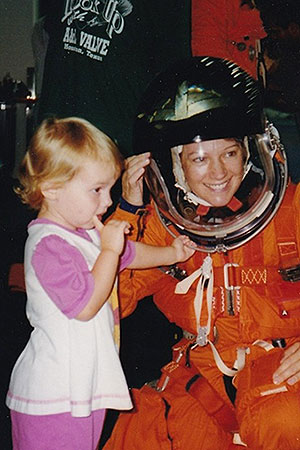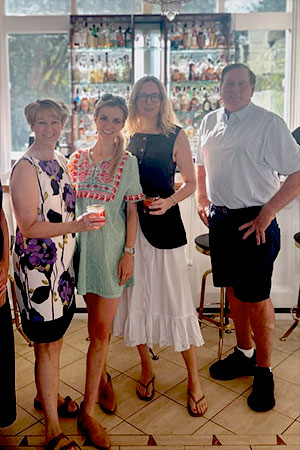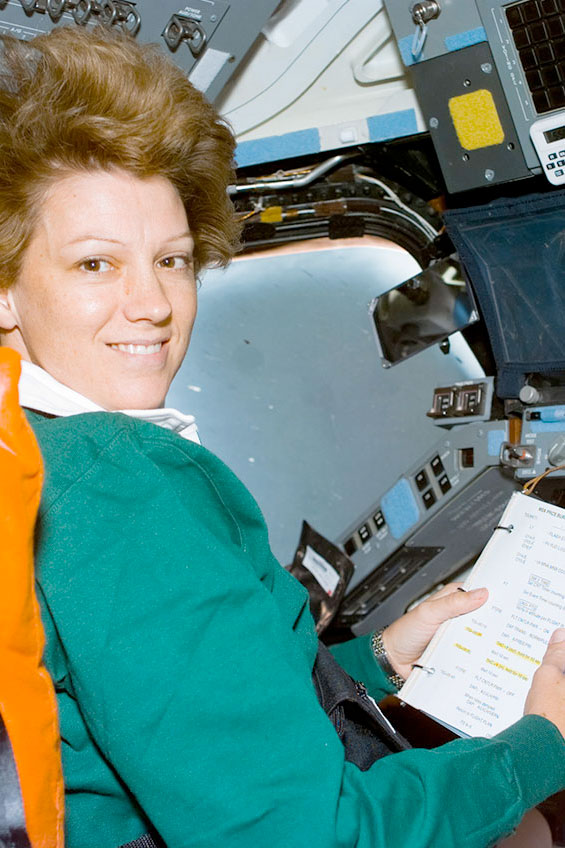November 15, 2024 — The dictionary defines "spacewoman" as simply "a woman astronaut." In the case of its latest usage, though, the term carries more meaning.
"Spacewoman," a new feature-length documentary from Haviland Digital and Tigerlily Productions, tells the story of Eileen Collins, the United States' first female astronaut to pilot and command a space shuttle mission. The title seems obvious given its subject, but it was not something that Collins, herself, ever considered.
"The funny thing about it is I would never have thought of it," said Collins in an interview with collectSPACE. "At one point [during the making the film] I asked, 'Did we come up with a title?' and Hannah said, 'Spacewoman.' And it made me wonder why I don't think of it."
For her part, director Hannah Berryman says it was the producers who came up with the title, but it was a perfect fit.
"It just stuck," she said. "It was really important to me that it [conveyed] it wasn't just that Eileen was a woman who went to space, but that she was the pilot and in command."
For Collins, it was also about reaching a wider audience.
"I think it will draw in some younger viewers and I really want high school and college age people, men and women, to watch the film, because I think it will help them decide to someday be part of the space program, or that they could work in the space industry," said Collins. "I like that it's simple, it's descriptive and it's exciting. That is why I am happy with it."
collectSPACE spoke with Collins and Berryman ahead of the world premiere of "Spacewoman" as part of the annual Doc NYC film festival in New York City on Saturday (Nov. 16). In addition to two in-person screenings with both its star and director in attendance, tickets are available to watch the film online from Sunday through Dec. 1.
This interview has been edited for length and clarity.
collectSPACE (cS): The documentary is based in part on your autobiography written with Jonathan Ward, "Through the Glass Ceiling to the Stars: The Story of the First American Woman to Command a Space Mission," as published in 2021. Where did the idea of making the book into a film originate?
Eileen Collins: Keith Haviland [of Haviland Digital]. He has made quite a few space films. He produced "Mission Control: The Unsung Heroes of Apollo" and "The Last Man on the Moon." He has also done aviation documentaries, including "Lancaster: Above and Beyond" and "Spitfire," for example.
He contacted my co-author, Jonathan Ward, the same month that the book came out. We were interested but busy promoting the book, so a year went by before we really started talking about doing the film.
cS: Hannah, with Eileen's book to work with, how did you arrive at the approach you followed for the film?
Hannah Berryman: In my films, I am interested in exploring the emotional aspect of how we live our lives and the things that we do. So immediately I knew that Eileen's family story — her journey through it, from the coming up that she had to actually being a woman going into space with her own family — I knew that would be central ot the film. I also could tell that her final mission [STS-114, NASA's return to flight after the loss of space shuttle Columbia] was such a pivotal one and there was quite a lot in jeopardy.
So I thought both stories would collide in that final mission. We would hear how everything played out emotionally and physically in the mission.
cS: Where did you source the archival video and photos you used in the film?
Berryman: We had an archive researcher in the U.S. who specializes in NASA, but we also had a great resource in Eileen and checked all of her archives on VHS and then DVD. Especially important were her home videos, which I think were invaluable to telling her personal tale, the backdrop to all her public-facing footage.
Eileen was also given the mission highlights from each of her flights, including the footage she and her crewmates shot.
So I think we couldn't have have really made the film without the mixture of the footage that we had and that's what we used.
cS: "Superwoman" includes footage shot of video calls that you, Eileen, had with your family while in space. Was this the first time you have shared these calls with the public?
Collins: Those are private, NASA never put those out. They are called family conferences. We only got them on flights when the mission was over a certain number of days. My daughter was only three and a half back then.
So I had the family conference videos from my third spaceflight, STS-93, and also from 114. Hannah repeatedly asked me for them. "We really want it. We really want it." So I dug them out from a box somewhere in a corner. It took me a while to find them.
cS: Astronauts Michael Foale, Cady Coleman and Charlie Camarda appear in "Spacewoman," each having flown with Eileen. Was there an attempt to reach out to other crew members?
Berryman: I don't have lots and lots of interviews in the films I do, because I want you to get to know the people who you see on screen, who are the supporting cast. So I only really wanted to talk to one person from each of Eileen's four missions and Mike Foale, having flown on STS-63 and 84, covered the first two.
With Cady, it was good to have another woman colleague and she was on Eileen's first command mission. And then when we were thinking about who to have from STS-114 and Charlie came up as someone who Eileen had talked well about. He was candid and a good talker — you could listen to him and be engaged, as with Mike and Cady.
So we didn't go further. We didn't interview anyone else from those missions. We did have members of Mission Control with Wayne Hale and Paul Dye, and we had Marsha Dunn who as a journalist was covering Eileen's flights.
Collins: I might add that I did contact my mission commanders; Jim Wetherbee was on 63 and Charlie Precourt on 84. So they both knew that the film was being made.
cS: Eileen, your son and daughter, as well as your husband, are also interviewed. Is this the first time your children have shared their memories on camera?
Collins: For my son, yes. Now, he was four years old when I flew my last mission, so Luke — that's his name, Luke Youngs — he had a dim memory of that time.
As for Bridget, the first time being interviewed, it's tough. It's tough to be on camera. I told her I thought she did a really good job and was authentic, which is what matters.
cS: The topic of fear comes up several times during the documentary. Eileen, why do you think it's difficult for the public to understand how you could not experience fear when launching or returning from space?
Collins: I tell people fear is normal, it's human and everybody has it. The way you conquer it is by learning everything about what you are afraid of.
I learned about the space shuttle technically, as well as I got to know the people that worked on the shuttle, everyone from the technicians that put their hands on the equipment to the engineers. I think as a leader, it was also very important for me to give confidence, not only to my crew, but to my family.
For example, after the Columbia accident, I stayed fully engaged in whatever was going on with the return flight issues as well as the accident investigation. Staying fully engaged on that is what gave me the confidence and the commitment to say, yes, it's safe. It's now time to go.
If I had any fear, I would have said, no, we're not ready yet. Let's go fix this particular issue that I'm concerned about. And I wouldn't have gone unless they answered any concerns that I had.
Berryman: That is the amazing thing about Eileen that I hope comes across in the film: She learned that, even as a child, you can't control everything. So you worry about the things you can control and the others, you just have to get on with. That is what was amazing about the presence of mind Eileen has.
Eileen was a big part of a new step for women. And for someone like herself, from her background, to overcome what she did and all of her family to come through it in such an amazing way, I hope people come away from "Spacewoman" inspired.
Collins: Astronauts are humans. We are regular people. We have families. We have issues going on in our lives, similar to what other people have. I think the way that Hannah did the movie shows that we know we're not just robots. We're not perfect specimens. You know, we have a human side to us and I think that is something that comes across when watching the film. |
|

Astronaut Eileen Collins and her daughter, Bridget Youngs, are featured in the documentary "Spacewoman." (Spacewoman Film)

Key art for the new documentary "Spacewoman" featuring Annie Leibovitz's portrait of astronaut Eileen Collins. (Spacewoman Film)

Former astronaut Eileen Collins (left), her daughter Bridget Youngs, "Spacewoman" director Hannah Berryman and Pat Youngs, Collins' husband. (Hannah Berryman/Instagram)

Astronaut Eileen Collins looks over a checklist at the commander's station on the flight deck of space shuttle Columbia. (NASA) |
